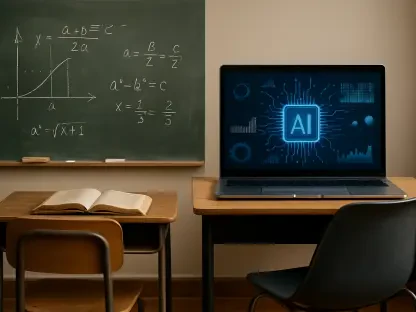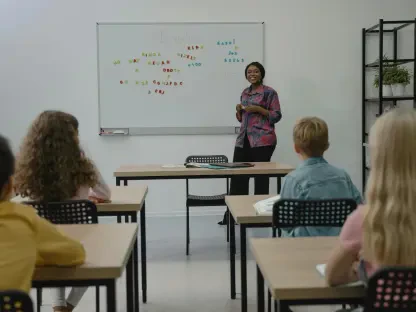Imagine a classroom where lessons are tailored to each student’s pace, assessments are graded instantly by algorithms, and career advice is shaped by predictive analytics, a reality now unfolding in schools across the nation. Artificial intelligence (AI) is revolutionizing education, promising personalized learning while raising profound questions about the value of traditional degrees and future job prospects. This roundup gathers diverse perspectives from educators, industry leaders, and survey data to explore whether students and parents are truly ready for this seismic shift. The aim is to uncover the anxieties, opportunities, and actionable strategies that define this critical moment in learning.
Navigating the AI Revolution in Education: Setting the Stage
AI is rapidly altering the educational landscape, introducing tools that customize learning experiences and automate administrative tasks like grading. From adaptive learning platforms to virtual tutors, technology is creating pathways for students to engage with content in unprecedented ways. Yet, this transformation brings with it a pressing need to reassess how education prepares individuals for a world increasingly influenced by automation.
The stakes are high as perceptions of college value and career trajectories are reshaped. Many now question whether a four-year degree can compete with the accessibility of AI-driven, self-directed learning resources. Parents and students alike find themselves at a crossroads, balancing the promise of innovation with uncertainties about its long-term impact.
This discussion sets the stage for a deeper dive into the concerns and possibilities surrounding AI in education. It highlights the dual role of technology as both a powerful tool and a potential disruptor, urging a closer look at how families can adapt to these changes. The focus remains on understanding the broader implications for learning environments and future readiness.
Unpacking the Impact of AI on Students and Parents
Grappling with Uncertainty: The Fear of Diminishing College Value
A growing skepticism surrounds the relevance of a traditional college degree in an AI-dominated era. Recent survey data reveals that two-thirds of parents are reevaluating the worth of higher education, driven by declining enrollment rates and the rising cost of tuition. This shift reflects a broader concern that conventional paths may no longer guarantee a competitive edge.
Industry leaders in education note that the high financial burden of college is increasingly weighed against free or low-cost AI tools that offer alternative learning opportunities. Many families worry that the skills taught in universities might become obsolete as automation advances. This tension fuels debates about whether institutions can justify their value in such a dynamic landscape.
The conversation also touches on how colleges must evolve to address these doubts. There’s a push for curricula that emphasize unique human skills and practical outcomes over traditional academic benchmarks. As AI continues to democratize knowledge, the pressure is on educational systems to redefine their purpose and deliver measurable benefits.
Job Market Jitters: Will AI Narrow Career Horizons?
Anxiety about future employment looms large, with over half of surveyed parents expressing concern that AI could limit their children’s professional opportunities. Household discussions about technology’s role in the job market are frequent, often tinged with caution and uncertainty. This reflects a pervasive fear that automation might displace roles once considered stable.
Real-world trends show teenagers widely using AI tools like chatbots for schoolwork, yet parental reactions remain mixed, with many describing their outlook as wary or apprehensive. The rapid integration of such technology into daily life amplifies worries about whether young people will be equipped to navigate a shifting workforce. The emotional weight of these concerns is palpable in family conversations.
On the flip side, some experts argue that AI could spawn entirely new career categories, even as it disrupts others. The challenge lies in predicting which skills will remain relevant amid rapid change. This uncertainty underscores the need for adaptable education models that prepare students for both current and emerging demands in the job market.
A Double-Edged Sword: AI as Both Threat and Promise
AI elicits paradoxical views among families, with a significant portion of students using it daily while still harboring fears about its broader implications. Survey findings indicate that nearly one-third of teens rely on these tools regularly, yet many share their parents’ unease about long-term effects. This duality highlights the complex relationship with technology in education.
Interestingly, optimism appears more pronounced among families connected to private or charter schools, where access to innovative programs may shape positive attitudes. About 30% of parents express hopefulness, seeing AI as a gateway to new possibilities. This suggests that exposure to forward-thinking curricula could influence perceptions of technology’s role in learning.
Challenging the notion that AI is purely a disruptor, some educational thought leaders emphasize its potential to enhance productivity and personalize education. If harnessed strategically, it could complement human capabilities rather than replace them. The key lies in fostering a balanced approach that mitigates risks while capitalizing on benefits.
Shifting Paths: The Rise of Alternative Education Options
Non-traditional educational routes are gaining traction as viable alternatives to four-year degrees, with over half of parents considering options like community colleges or technical schools. These pathways are often seen as practical backups, especially as doubts about conventional higher education grow. The appeal lies in their focus on immediate, applicable skills.
Demographic insights reveal varying levels of interest in apprenticeships, with some groups showing stronger enthusiasm for hands-on training programs. Experts in vocational education advocate for these alternatives, arguing they better align with the needs of an AI-influenced workforce. Such programs prioritize adaptability, a critical asset in rapidly evolving industries.
Envisioning the future, these alternative paths could offer a more direct route to career readiness, sidestepping the hefty costs and time commitments of traditional degrees. They present a compelling counterpoint, emphasizing real-world preparation over academic prestige. This shift signals a broader reevaluation of how success in education is defined and achieved.
Key Insights and Practical Steps for Embracing AI in Education
The core concerns about college value and job prospects remain at the forefront of discussions about AI in education. Families grapple with whether traditional paths can withstand the technological tide, while also recognizing AI’s potential to open new doors. This dual perception frames the challenge of preparing for an unpredictable future.
Practical strategies for navigating this landscape include seeking programs that blend human-centric skills, such as creativity and critical thinking, with AI literacy. Parents and students are encouraged to prioritize educational experiences that technology cannot replicate. This approach ensures a foundation that remains relevant regardless of automation’s reach.
Staying informed about evolving trends is equally vital, as is leveraging AI tools to enhance rather than replace traditional learning. Families can explore resources that integrate technology thoughtfully, ensuring it serves as a supplement to critical thinking and interpersonal skills. Proactive engagement with these tools can turn uncertainty into opportunity.
Looking Ahead: The Future of Learning in an AI World
Reflecting on the discourse, it became evident that education had to adapt swiftly to keep pace with AI’s influence. The insights gathered underscored a shared understanding that learning systems needed to prioritize skills beyond technology’s grasp. This realization marked a turning point in how preparedness was viewed.
Moving forward, the focus should be on fostering environments where innovation and human potential coexist. Families and educators alike are encouraged to advocate for curricula that balance technical proficiency with uniquely human traits. Exploring emerging educational models can provide fresh perspectives on readiness.
As the conversation evolved, a lingering question persisted about redefining success in this new era. The next step involves embracing collaboration between schools, industries, and communities to build resilient frameworks for learning. This collective effort holds the key to transforming challenges into lasting advancements.









